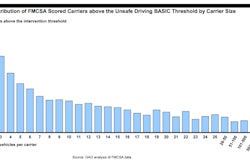(EDITOR’s NOTE: This is the final installment of a series on CSA, based on several presentations, discussion and follow-up from the recent American Trucking Associations Management Conference and Exhibition. Part 1 focuses on whether CSA is, essentially, a new safety rating. In Part 2, FMCSA explains changes to the carrier safety information website. In Part 3, representatives of ATA and FMCSA debate the program’s effectiveness. Part 4 features a discussion of the state-to-state differences in enforcement as reflected in CSA data.)
With a pending challenge in federal court, as well as ongoing reviews by the DOT Inspector General and the Government Accountability Office, a prominent critic of Compliance, Safety, Accountability is hopeful that a change in favor of smaller carriers is coming. The Federal Motor Carrier Safety Administration says it welcomes the scrutiny – and the safety program has passed muster before.
“The trucking industry is made up of tens of thousands of small business people, and they’re under assault in terms of trying to deal with a system that is unfairly classifying those carriers as having a safety issue,” says Tom Sanderson, Transplace CEO and front man for the Alliance for Safe, Efficient and Competitive Truck Transportation. “There is a segment of large carriers that would like to use SMS as a competitive weapon. That’s not about safety. Those carriers know full well the scores have no relationship with accident frequency. It’s simply a way to put small carriers out of business and jack up prices.”
Transplace, a billion-dollar 3PL and technology company, was founded by a group of large carriers, and Sanderson himself has worked at a couple of the largest. So he admits to being somewhat sympathetic.
“Trucking’s a tough business. There haven’t been many years since deregulation where the truckload segment has been able to get the pricing they’d like to offset the rising costs,” Sanderson says. “Carriers would like to see a tight capacity environment that would allow them a little more pricing power. But this is not the way to do that. In almost all cases, most of these big companies started out as small carriers. They’ve been there. They should know better.”
ASECTT has filed suit in federal court to block the public presentation of carrier safety data. Oral arguments were presented in September, and Sanderson tells CCJ he expects a ruling in the next couple of months.
Because of federal appellate court rules, the ASECTT challenge is limited to a very narrow issue, Sanderson explains. So problems with data accuracy or state-by-state variability could not be addressed. Instead, the argument is whether FMCSA, in publishing the SMS data and then advising shippers and brokers to use that data in carrier selection, constitutes a rule – one implemented without the required federal rulemaking process.









